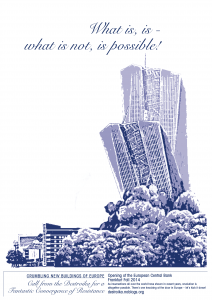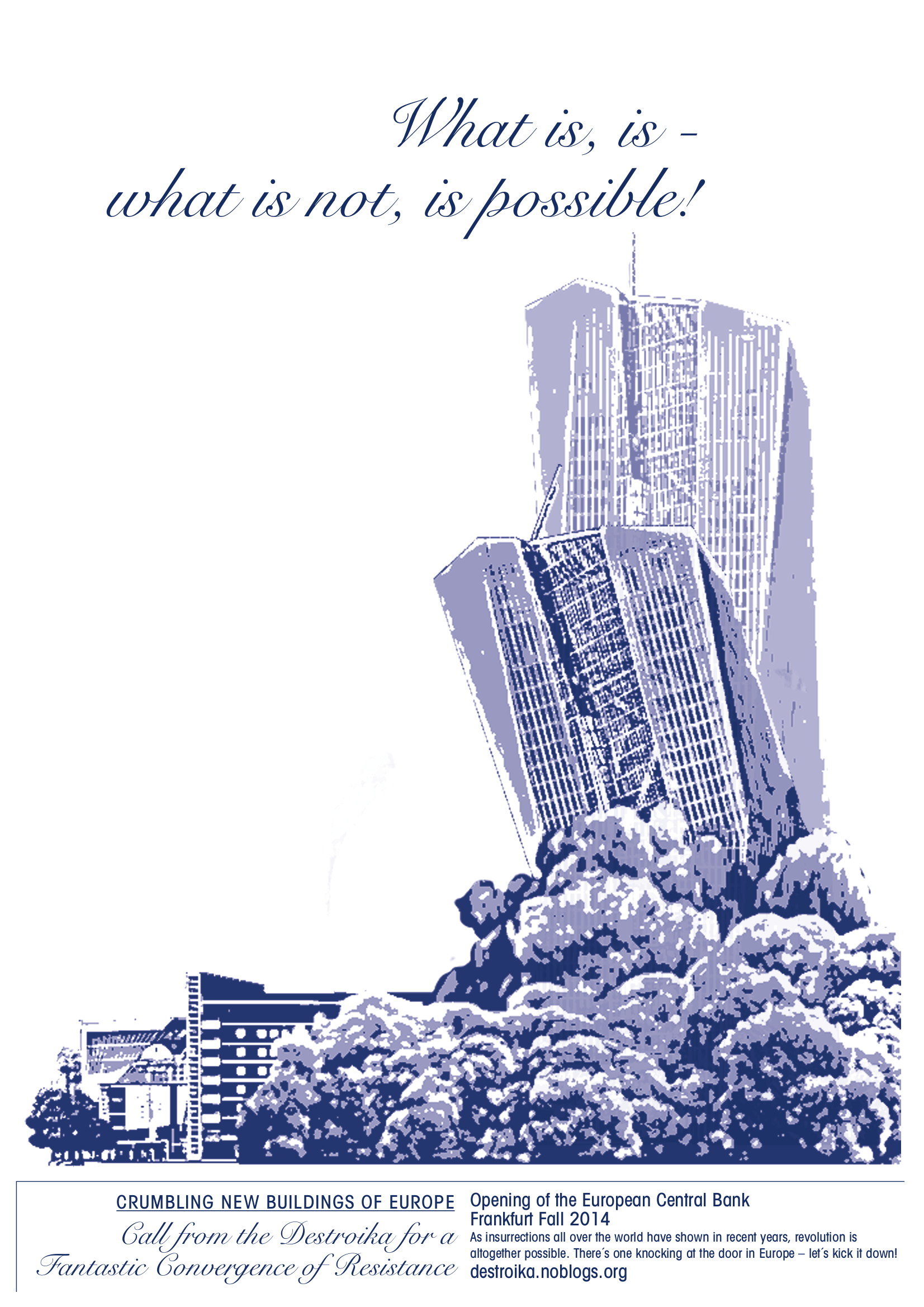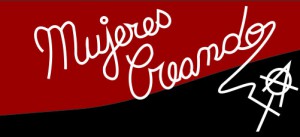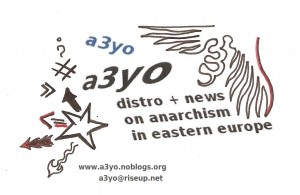(source: http://avtonom.org/en/author_columns/anarchism-context-civil-war)
On Friday, the 2nd of May, the House of Trade Unions in Odessa caught on fire. Altogether at least 42 people lost their lives during the clashes in the city, most of them in the fire and the others in streetfights. There is an excellent Russian language, eyewitness account of the events available here.
Events began to unfold when armed pro-Russian AntiMaidan fighters attacked a demonstration organised by football hooligans with nationalist sympathies. This attack resulted in lethalities, but soon the pro-Russians were overpowered. They escaped back to their protest camp in the Kulikovo field, but pro-Kiev demonstrators followed and lit the protest camp on fire. The pro-Russians then escaped to the House of the Trade Unions, which soon caught on fire. The fire spreading, is visible in this video. At the 2 minute mark, you can see a flame behind a closed window, making it plausible that some of the fires were started from the inside. For example, due to accidents with Molotov cocktails which were used by both sides during the fight. However, you can also see pro-Ukrainian nationalists throwing Molotov cocktails, making them at least partially responsible for the fire.
There are doubts as to whether the core group of pro-Russians who attacked the demonstration with firearms were outside provocateurs. But certainly, there were people in the House of Trade Unions, who had nothing to do with the attack. In a number of photographs, you can see police protecting the core group of attackers. Otherwise, police were very passive during the fire, and did not interfere in the events. Even if the police were not part of a conspiracy, at the least, they acted completely unprofessionally.
During the weekend, troops of the central government and local «federalists» had been waging war in the city of Kramatorsk in Eastern Ukraine. This means, that what is happening in the Ukraine can already be considered a civil war. In the upcoming weeks, it will become clear how widely the warfare will spread and if Russia will interfere.
I consider myself an expert on the Russian context as I lived in Moscow for more than 12 years, but this does not mean that I am an expert on the Ukrainian one. I have only visited the country three times in the last years, and have hardly more than 20 friends there. Still, when getting myself acquainted with the Ukraine, I quickly understood that civil war could be a possible scenario there. All of my Ukrainian friends, however, were absolutely certain, that nothing like that would ever happen there. That even with all the differences between Eastern and Western Ukraine, no-one was prepared to kill in their name. They were convinced, that Ukraine could never become another Yugoslavia. All of them had acquaintances, friends and loved ones on both sides of the river Dnieper, both Ukrainian and Russian speakers. But if you only ever take into consideration your own friends, you will fall into the trap of scaling, obstructing those mechanisms which create hatred on a large scale.
War does not require personal hatred between people, geopolitical and economical reasons are good enough for that. And in the Ukraine, the geopolitical interests are far greater than in Yugoslavia. If you have an interest in flaring up ethnic hatred or war, a rather small ethnic rift is enough. A few abuses, murders, and kidnappings, and everyone will be ready for battle. This has succeeded now in Ukraine, just as it has succeeded in many other places.
At the moment, the Western «left» seems to be pretty much clueless in terms of the events taking place there. This is because the «left,» broadly speaking, is not a very useful concept in the former Soviet Union, as it can mean anything from social-democrats and anarchists, to stalinists supporting Putin. Personally, I prefer to always write the word in quotation marks. I identify with anarchists, not the «left,» since, for quite a while now anarchists have been the only political force in Russia which united the ethos of opposing racism, sexism and homophobia to the ethos of social equality. Until very recently, there had not been much of any Western «new left» in Russia, with the exception of a handful of Trotskyists.
A split within the «left» in Ukraine is completely predictable and even necessary. In Kharkiv the streetfighting, Stalinist organisation, «Borotba» (meaning Struggle) has been on the opposite side of the anarchists. In this region of the former Soviet Union, 99.9% of the «left» will always support imperialism for the sake of «being with the people.» It is about time that anarchists refuse the «left» label. We have nothing in common with these people.
But anarchists, too, can be easily manipulated with buzzwords such as «self-organisation» and «direct democracy.» For example, Boris Kagarlitsky, a Russian intellectual widely known amongst the Western «left» and a frequent guest of World Social Forums, has found favorable ground in the West by using these buzzwords.
Apparently, the Ukrainian and Russian anarchists could not foresee the developments which lead to the civil war. Maidan had only been discussed from the point of view that it could offer something better than the Yanukovich regime. It was not expected that Russia would react to a Maidan victory with a conscious escalation of the conflict, and which could eventually lead to civil war.
Whereas Russia is the major propaganda machine and arms provider in the conflict, Western countries are not doing much better, as they only acknowledge the interests of the new government in Kiev and present the movement in Eastern Ukraine as mere Russian puppets.The armed wing of the «federalists» are definitely Kremlin puppets, but if it were not for the widespread discontent and protests against the new regime in Kiev, this armed wing would not have emerged.
I do not believe that a civil war was the Kremlin’s aim. First of all, it wanted to destablizie Ukraine to the maximum in order to have Kiev give up any attempts to gain back control over Crimea. Now the situation is out of the Kremlin’s control, and it may have to send regular troops to Ukraine in order to fulfill the promise of support it has given to the «federalists.»
The government in Kiev has given so many «final ultimatums» which were quickly forgotten, and has announced so many unexisting «anti-terrorist operations,» that it is clear it has very few battle-ready troops. A few times, the central government troops have actually taken action and the results have been tragi-comic. Thus, the government understands that it’s still in question whether it would succeed in a full-scale civil war. However, it also understands, that war can help discipline society and stabilize the new order to the extent, that any promises given to Maidan would be forgotten. With time, both sides have come to understand that a full-scale war might be necessary for their interests, even if neither was initially planning for this.
Disagreements within the anarchist movement
Over the course of events, the Ukrainian and Russian anarchist movements have split into three different sides. A first group concentrated on producing internet-statements against both sides of the conflict. For them, keeping out of any social processes is a matter of principle, and they only want to monitor and assess. Participation in the social protest is not a goal for them, as they prefer to keep their hands clean. Since every process has input from either disgusting liberals, hated nationalists, awful stalinists, all three at the same time, or other undesirables, one can never fully participate in anything and the only alternative is to stay home and publish statements on the internet about how everything is going from bad to worse. However, most of the time these statements are just self-evident, banalities.
A second group, was made up of those who got excited about all the riot-porn and anti-police violence in Kiev, without considering who was carrying out this violence and in whose interests. Certain antifascists drifted as far as to defend the «national unity» in Maidan, and threatened particular Kiev anarchists due to their criticism of Maidan and refusal to participate. Most of the people in this camp are just fans of anti-police violence without any theoretical frame, but some want to give Maidan an imagined anti-authoritarian flavor, by equating the general meeting of Maidan («Veche») with the revolutionary councils established during 20th century revolutions. They base this claim on the social demands occasionally presented at Maidan, but these demands were always at the periphery of the Maidan agenda.
One of these peripheral demands was the proposal that oligarchs should pay a tenth of their income in taxes and was generally in tune with nationalistic populism. However, the demands of the Kiev Maidan were still far from returning the billions stolen by oligarchs back to society. In Vinnytsa and Zhitomir, there was an attempt to expropriate factories owned by German capital , but this was the only case going beyond the national-liberal context that I am familiar with.
In any case, the main problem at Maidan wasn’t the lack of a social agenda and direct democracy, but the fact that people did not even demand them. Even if everyone kept repeating that they did not want another «orange revolution» like in 2004, nor for Yulia Timoshenko to return, at the end of the day chocolate industrialist Poroshenko and Vitaly Klitchko are leading the polls. This was the choice the people made as they grew weary of the revolutionary path as proposed by the radical nationalists of the Right sector. As of now, people want to return to «life as usual,» to life before Yanukovich, and are not prepared to make the sacrifices that further revolutionary developments would demand. Representative democracy is indeed like a hydra, if you cut one head, two will grow in its place.
However, none of the fears of «fascist takeover» have materialized. Fascists gained very little real power, and in Ukraine their historical role will now be that of stormtroopers for liberal reforms demanded by the IMF and the European Union — that is, pension cuts, an up to five times increase in consumer gas prices, and others. Fascism in Ukraine has a powerful tradition, but it has been incapable of proceeding with its own agenda in the revolutionary wave. It is highly likely, that the Svoboda-party will completely discredit itself in front of its voters.
But anyone attempting to intervene, anarchists included, could have encountered the same fate — that is, to be sidelined after all the effort. During the protests, anarchists and the «left» were looking towards the Right sector with envy, but in the end all the visibility and notoriety, for which they paid dearly, was not enough to help the Right sector gain any real influence.
If Kiev anarchists would have picked the position of «neutral observers» after Yanukovich had shot demonstrators, it would have completely discredited them. If after being shot, the working class, or more exactly «the people,» that is, the working class along with the lower strata of the bourgeoisie, would have failed to overthrow Yanukovich, Ukrainian society woul have fallen into a lethargic sleep such as the one Russian and Belarusian societies are experiencing. Obviously, after the massacre there was no choice left except to overthrow the power, no matter what would come in its place. Anarchists in Kiev were in no position to significantly influence the situation, but standing aside was no longer an option.
And thus, we come to the third, «centrist,» position taken by anarchists — between the brainless actionism and the «neutral» internet statements. The camp of realist anarchists understood, that even if the Maidan protests pretty much lacked a meaningful positive program, something had to be done or the future would be dire.
The limits of intervention
In Kiev, anarchists took part in a number of important initiatives during the revolutionary wave — first of all the occupation of the ministry of education, and the raid against the immigration bureau by the local No Border group, which was looking for proof of illegal cooperation with security services of foreign countries. But the most succesful anarchist intervention was the one in Kharkiv, where Maidan was relatively weak but also freeer of nationalistic influence.
Still, such centrism has its own problems. For one, you might unintentionally help the wrong forces gain power, also discrediting radical protest. A second problem would be that you might end up fighting a fight which is not your own. When AntiMaidan attacked the Maidan in the city of Kharkiv, its imagined enemy were not the anarchists, but NATO, EU or Western-Ukrainian fascists. Since anarchists had joined Maidan, it would have been cowardly to desert once the fight started. Thus anarchists ended up fighting side by side with liberals and fascists. I do not want to criticize the Kharkiv anarchists, after all they made, perhaps, the most serious attempt among Ukrainian anarchists to influence the course of events, but this was hardly the fight, and these were hardly the allies they wanted.
And so, comes the point when desertion becomes imperative, and that is when civil war begins. As of now, it’s still too early to make any final assessment of the anarchist attempts to influence Maidan, but after the beginning of a civil war, Maidan will no longer play a role. From now on, assembly will gradually turn to the army, and assault rifles will replace Molotov cocktails. Military discipline will replace spontaneous organisation.
Some supporters of the Ukrainian organisation, Borotba (meaning Struggle) and the Russian Left Front claim that they are attempting to do the same things as the anarchists did at Maidan, that is, direct protest towards social demands. But AntiMaidan has no structures of direct democracy, not even distorted ones. It quickly adopted the model of hierarchical, militaristic organisations. The AntiMaidan leadership consists of former police and reserve officers. It does not attempt to exert influence through the masses, but with military power and weapons. This makes perfect sense, considering that according to a recent opinion poll, even in the most pro-«federalist» area of Lugansk, a mere 24% of the population is in favor of armed takeovers of government structures. That is, AntiMaidan cannot count on a victory through mass demonstrations.
Whereas at its essence Maidan was a middle-class liberal and nationalistic protest, supported by part of the bourgeoisie, AntiMaidan is purely counter-revolutionary in tendency. Of course, AntiMaidan has its own grassroots level. One could attempt to intervene, but an intervention by joining would mean supporting a Soviet, imperialist approach. The Communist Party of the Russian Federation, Borotba, the Russian Left Front and Boris Kagarlitsky have all joined this Soviet chauvinist camp. Intervening in Maidan made sense only as long as the enemy were Berkut police forces and paid thugs. When the opponents are mislead AntiMaidan participants, it no longer makes sense to fight in the streets.
When looking at either side of the conflict one can see a dangerous tendency, which every anarchist and anti-authoritarian will face in the future: the recuperation of anti-authoritarian rhetoric and terminology for the purposes of hierarchical ideologies. On the one side, «autonomous nationalists» who have found sympathy amongst many anarchists, and on the other, intellectuals such as Boris Kagarlitsky. Both characterising warring factions with attributes such as «direct democracy» and «self organisation.» In reality, these characteristics are either present in a distorted form or not at all. When two different flavors of nationalism are «self-organising» in order to maim and murder each other, there is nothing to celebrate. Subsequent to the events in Ukraine, it is clear that anarchists must explain the essential difference between «self-organisation» and self-organisation to the world.
According to the opinion poll referenced above, in Eastern Ukraine as a whole, only 12% of the population supports the «federalists’» armed actions, whereas the Kiev government is supported by some 30%. The remaining 58% supports neither, and in conditions of civil war, this is the majority on which we should count. We should encourage desertion and conflict avoidance. Under any other conditions, and if anarchists had more influence, we could form independent units against both warring factions.
Unarmed civilians have stopped bloodbaths in several places by moving in between the troops as human shields. If not for this kind of civil disobedience, a full-scale war would have been launched much earlier. We should support this movement, and attempt to direct it against both «federalist» and government troops simultaneously.
In case Russia reacts either by occupying parts of Eastern Ukraine or the country as a whole, we could take the example of anarchist partisans in World War II era France and Italy. Under such conditions, the main enemy is the occupying army, as it will antagonise the whole population very quickly. But it is also necessary to keep the maximum distance from the nationalistic elements of the resistance, as any alliance with them would hinder anarchists from realising their own program in the framework of the resistance.
The events in Odessa are a tragedy, and it is possible, that among those who died in the House of the Trade Unions were also people who played no part in flaring up the violence. People who threw molotov cocktails at the House should have understood the consequences. Even if the fire igniting was not solely due to them, it is not for lack of trying.
In case civil war spreads, these deaths are just the beginning. No doubt that on both sides the majority only wants a better life for their close ones and their motherland, and many hate governments and oligarchs to an equal extent. The more sincerely naïve people die, the greater the pressure to support one of the factions in the war, and we must struggle against this pressure.
Whereas it may occasionally be worth it to swallow tear gas or to feel the police baton for a bourgeois revolution, it makes no sense at all to die in a civil war between two equally bourgeois and nationalist sides. It would not be another Maidan but something completely ifferent. No blood, anarchist or otherwise, should spill due to this stupidity.
Antti Rautiainen






